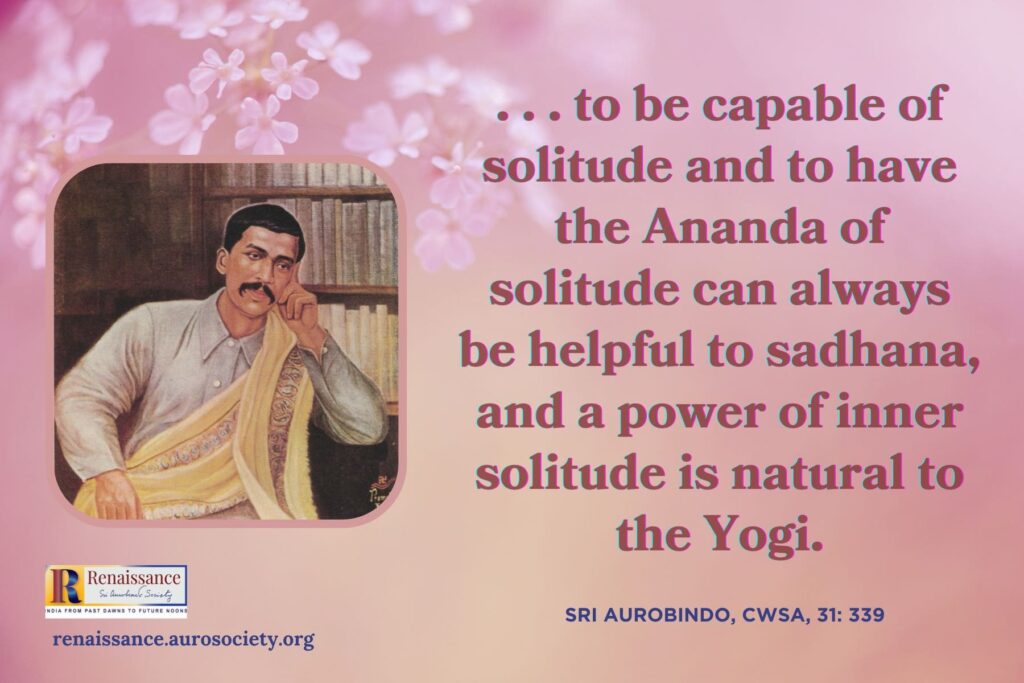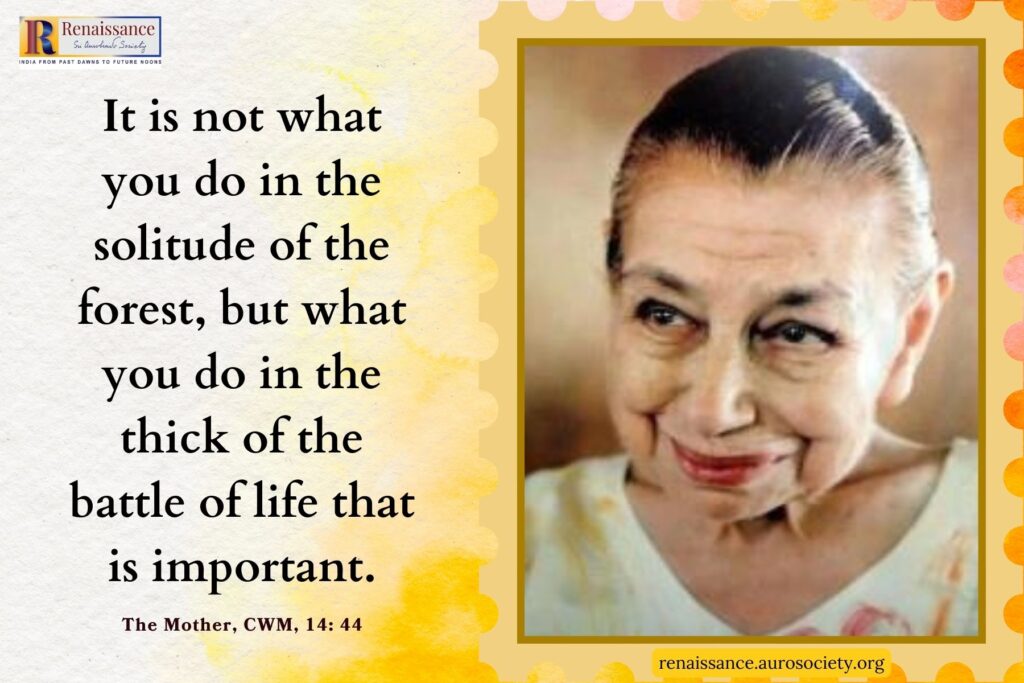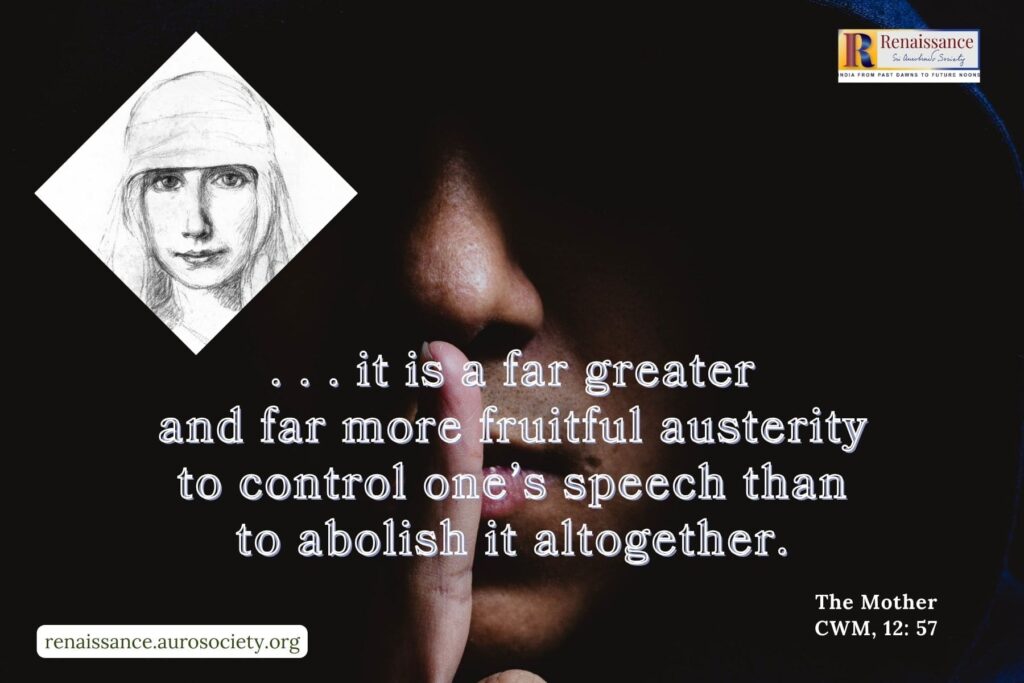Editor’s Note: We highlight here a few letters of Sri Aurobindo in which we get a detailed description of his first spiritual realization – that of Silent Brahman or Nirvana in 1908.

“In three days—really in one—my mind became full of an eternal silence…”
I am glad you are getting converted to silence, and even Nirvana is not without its uses—in my case it was the first positive spiritual experience and it made possible all the rest of the sadhana; but as to the positive way to get these things, I don’t know if your mind is quite ready to proceed with it. There are in fact several ways.
My own way was by rejection of thought. “Sit down,” I was told, “look and you will see that your thoughts come into you from outside. Before they enter, fling them back.” I sat down and looked and saw to my astonishment that it was so; I saw and felt concretely the thought approaching as if to enter through or above the head and was able to push it back concretely before it came inside.
In three days—really in one—my mind became full of an eternal silence—it is still there.
But that I don’t know how many people can do. One (not a disciple—I had no disciples in those days) asked me how to do Yoga. I said: “Make your mind quiet first.” He did and his mind became quite silent and empty. Then he rushed to me saying: “My brain is empty of thoughts, I cannot think. I am becoming an idiot.”
He did not pause to look and see where these thoughts he uttered were coming from! Nor did he realise that one who is already an idiot cannot become one. Anyhow I was not patient in those days and I dropped him and let him lose his miraculously achieved silence.
The usual way, the easiest if one can manage it at all, is to call down the silence from above you into the brain, mind and body.
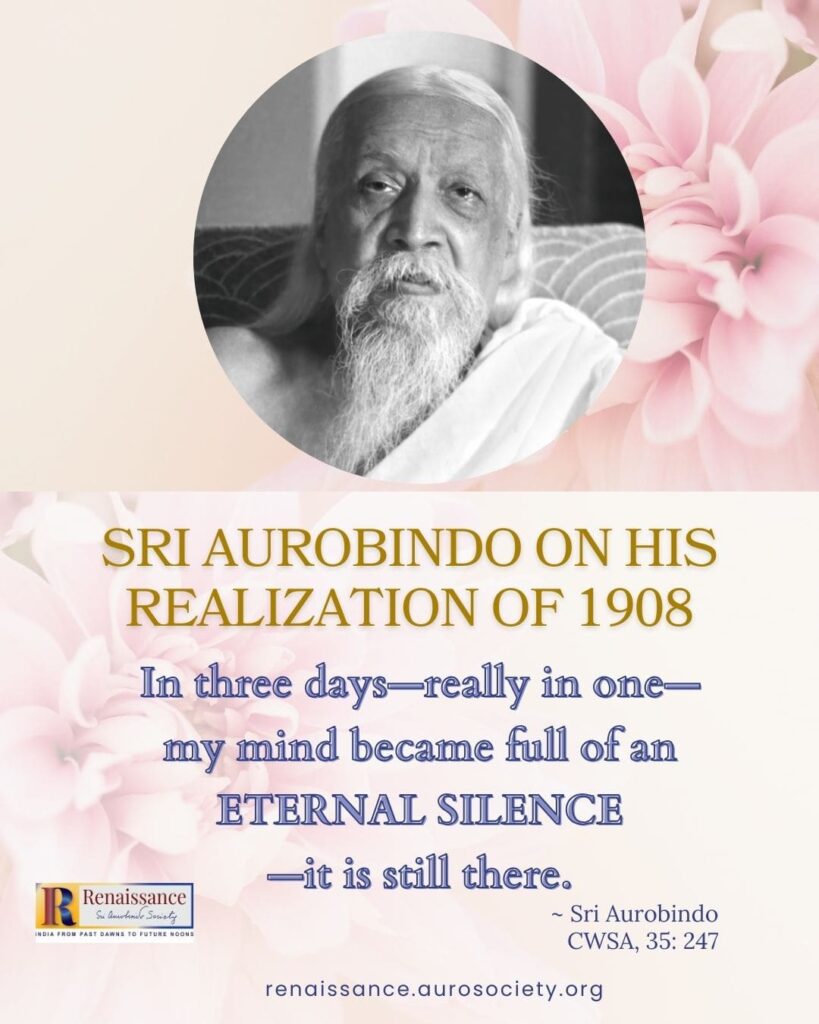
* * *
On His Nirvana Realization and Mayavada
Now to reach Nirvana was the first radical result of my own Yoga. It threw me suddenly into a condition above and without thought, unstained by any mental or vital movement; there was no ego, no real world—only when one looked through the immobile senses, something perceived or bore upon its sheer silence a world of empty forms, materialised shadows without true substance.
There was no One or many even, only just absolutely That, featureless, relationless, sheer, indescribable, unthinkable, absolute, yet supremely real and solely real. This was no mental realisation nor something glimpsed somewhere above,—no abstraction—it was positive, the only positive reality—although not a spatial physical world, pervading, occupying or rather flooding and drowning this semblance of a physical world, leaving no room or space for any reality but itself, allowing nothing else to seem at all actual, positive or substantial.
I cannot say there was anything exhilarating or rapturous in the experience, as it then came to me,—the ineffable Ananda I had years afterwards,—but what it brought was an inexpressible Peace, a stupendous silence, an infinity of release and freedom.
I lived in that Nirvana day and night before it began to admit other things into itself or modify itself at all, and the inner heart of experience, a constant memory of it and its power to return remained until in the end it began to disappear into a greater Superconsciousness from above.
But meanwhile realisation added itself to realisation and fused itself with this original experience.
At an early stage the aspect of an illusionary world gave place to one in which illusion is only a small surface phenomenon with an immense Divine Reality behind it and a supreme Divine Reality above it and an intense Divine Reality in the heart of everything that had seemed at first only a cinematic shape or shadow.
And this was no reimprisonment in the senses, no diminution or fall from supreme experience, it came rather as a constant heightening and widening of the Truth; it was the spirit that saw objects, not the senses, and the Peace, the Silence, the freedom in Infinity remained always with the world or all worlds only as a continuous incident in the timeless eternity of the Divine.
Now that is the whole trouble in my approach to Mayavada.
Nirvana in my liberated consciousness turned out to be the beginning of my realisation, a first step towards the complete thing, not the sole true attainment possible or even a culminating finale. It came unasked, unsought for, though quite welcome.
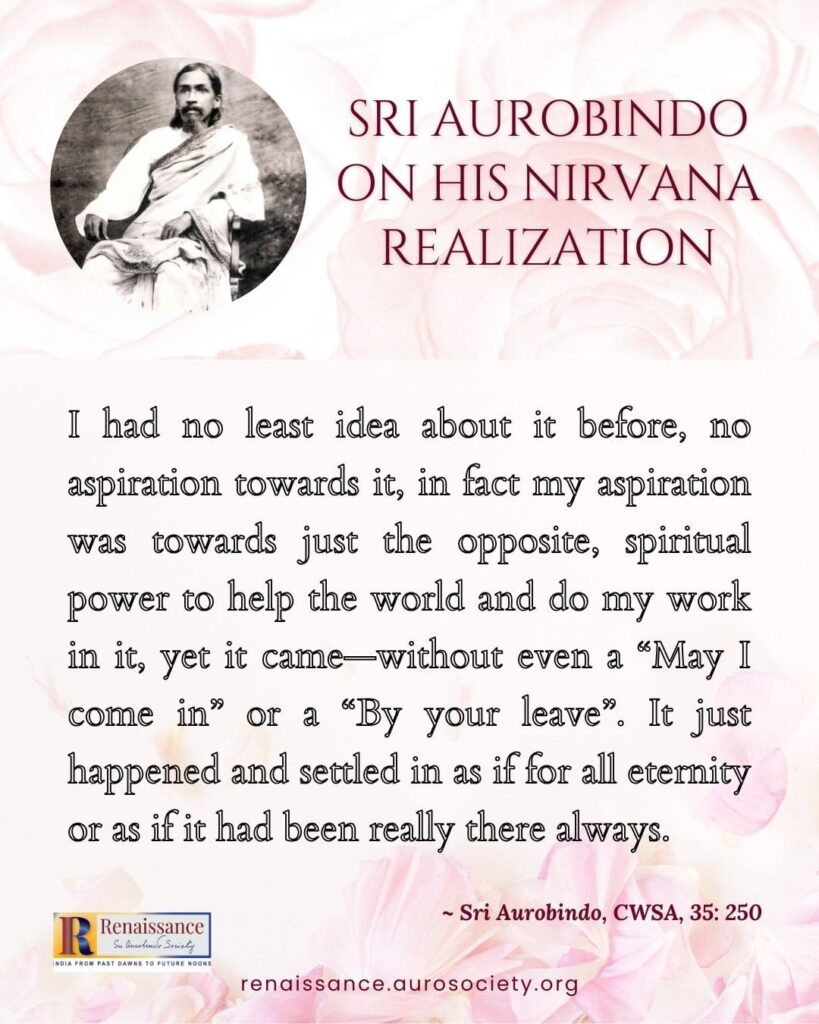
I had no least idea about it before, no aspiration towards it, in fact my aspiration was towards just the opposite, spiritual power to help the world and do my work in it, yet it came—without even a “May I come in” or a “By your leave”. It just happened and settled in as if for all eternity or as if it had been really there always.
And then it slowly grew into something not less but greater than its first self! How then could I accept Mayavada or persuade myself to pit against the Truth imposed on me from above the logic of Shankara?
But I do not insist on everybody passing through my experience or following the Truth that is its consequence.
I have no objection to anybody accepting Mayavada as his soul’s truth or his mind’s truth or their way out of the cosmic difficulty. I object to it only if somebody tries to push it down my throat or the world’s throat as the sole possible, satisfying and all comprehensive explanation of things.
* * *
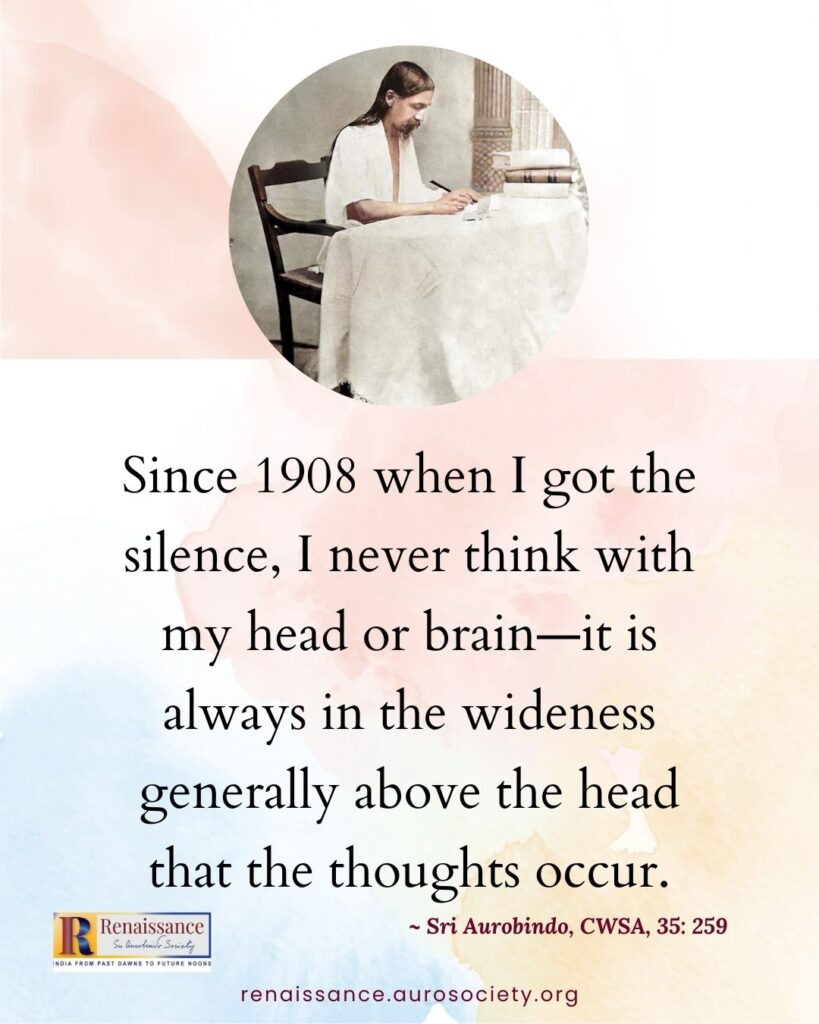
In the condition of absolute inner silence I was making speeches and conducting a newspaper, but all that got itself done without any thought entering my mind or the silence being in the least disturbed or diminished.
* * *
Also read: “A silent mind is the first step.”
On Quietistic Ideal and Sadhana
I believe I have as many hours of hard external work to do as almost anyone in the Asram and I am not aware that I have any leisure or spend even the very short time I have for concentration in a blissful quietism communing with the silent Brahman. Even my concentration is of the nature of action and it is not an airy quietistic contemplation…
I may add that I have not spent my life shouting down the quietistic ideal and sadhana without knowing why they followed it. All the experiences that the quietistic sadhana can give, I have had, the realisation of the featureless Parabrahman, Maya, Sunya, the illusoriness of the world, the Akshara Purusha.
I know also perfectly well why they turned away from the world and have gone through all the million difficulties which they did not care to face. None of the difficulties of which you enumerate one or two are strange to me—only I did not put the blame of them on anybody or on the Yoga and I overcame them.
Anybody can do the quietistic Yoga, who wants to do it.
But if anyone imagines that they [the quietistic yogas] are easy and that these difficulties do not occur there or that the sadhakas of these paths are all of them perfected saints free from the human passions and defects which you see here among the sadhakas, he is labouring under a great delusion.
No path of Yoga is easy and to imagine that by leaving the world and plunging inside oneself one automatically shuffles off the vital and external nature is an illusion.
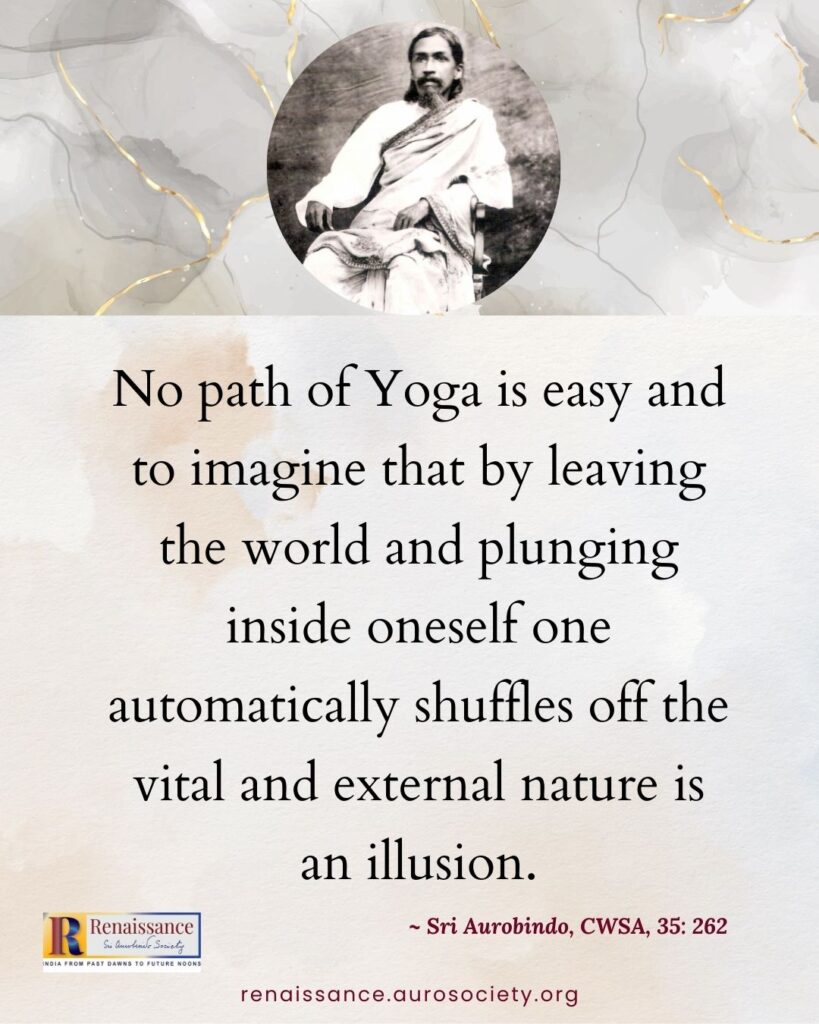
If I ask you to develop equanimity and egolessness by work done with opening to the Divine, it is because it is so that I did it and it is so that it can best be done and not by retiring into oneself and shutting oneself away from all that can disturb equanimity and excite the ego.
As for concentration and perfection of the being and the finding of the inner self, I did as much of it walking in the streets of Calcutta to my work or in dealing with men during my work as alone and in solitude.
* * *
~ Design: Beloo Mehra

